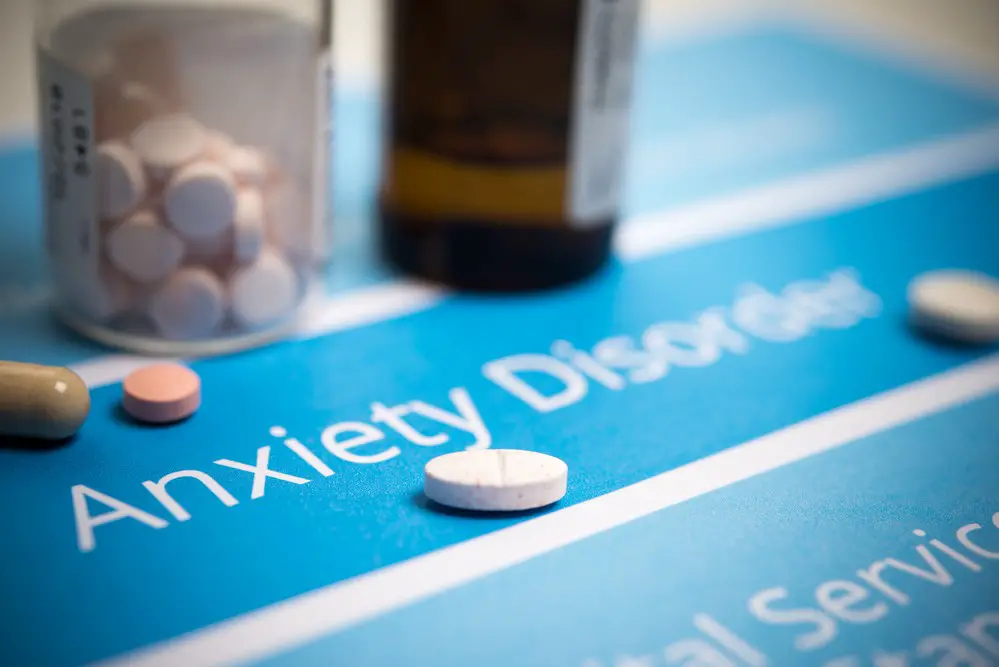As a BetterHelp affiliate, we receive compensation from BetterHelp if you purchase products or services through the links provided
Anxiety disorders are a prevalent issue affecting millions of people worldwide. These disorders can manifest in various forms, such as generalized anxiety disorder, panic disorder, and social anxiety disorder. To manage and alleviate the symptoms associated with these conditions, anxiety medications often play a crucial role in the overall treatment plan.
When prescribing anxiety medications, healthcare professionals with specific qualifications and expertise are authorized to do so. These professionals typically include psychiatrists, physicians, and sometimes nurse practitioners or physician assistants. These professionals have undergone comprehensive training and education to ensure they possess the knowledge and skills to prescribe appropriate medication for anxiety disorders.
Understanding who can prescribe anxiety medication is essential for individuals seeking help managing their anxiety. By identifying the appropriate healthcare providers, individuals can ensure they receive the necessary support and guidance in their journey toward improved mental health.
Understanding Anxiety Disorders
Generalized Anxiety Disorder
Generalized Anxiety Disorder (GAD) is a common mental health condition characterized by excessive and persistent worry about everyday life activities. The most common symptoms include restlessness, fatigue, difficulty concentrating, irritability, and sleep disturbances. Treatment for GAD can involve medications such as Xanax, Zoloft, or Lexapro, as well as therapy and lifestyle changes.
Panic Attacks
Panic attacks are sudden, intense episodes of fear and discomfort, typically lasting for several minutes. They may occur in response to a specific trigger or without apparent cause. Symptoms of panic attacks include heart palpitations, sweating, trembling, shortness of breath, and a feeling of impending doom. Treatment for panic attacks can involve a combination of medication and therapy to reduce the frequency and severity of the attacks.
Social Phobia
Social phobia, or social anxiety disorder, is a mental health condition characterized by an intense fear of social situations. People with social phobia often worry excessively about being judged, humiliated, or rejected by others. Common symptoms include blushing, sweating, trembling, and difficulty speaking in social situations. Treatment for social phobia can include medication, such as Zoloft or Lexapro, and therapy to help individuals build social confidence and improve communication skills.
Types of Anxiety Medications

Antidepressants
Antidepressants are a common type of medication prescribed for anxiety disorders. They work by affecting neurotransmitters in the brain, which helps to stabilize mood and reduce anxiety symptoms. Examples of antidepressants include selective serotonin reuptake inhibitors (SSRIs) like fluoxetine, sertraline, and citalopram, and serotonin-norepinephrine reuptake inhibitors (SNRIs) such as venlafaxine and duloxetine.
- SSRIs: Fluoxetine, Sertraline, Citalopram
- SNRIs: Venlafaxine, Duloxetine
These medications are typically prescribed to individuals with generalized anxiety, panic, and social anxiety disorders. However, it may take several weeks for antidepressants to start working, and patients should follow their healthcare provider’s instructions for proper use.
Benzodiazepines
Benzodiazepines are a class of medication that provides immediate relief from severe anxiety symptoms. They enhance the effects of a neurotransmitter called gamma-aminobutyric acid (GABA), which helps calm the nervous system. Examples of benzodiazepines include diazepam, lorazepam, and alprazolam.
- Diazepam
- Lorazepam
- Alprazolam
These medications are typically prescribed for short-term use due to the risk of dependence and withdrawal symptoms. They are commonly used for acute anxiety episodes or situational anxiety, such as flying or public speaking.
Buspirone
Another type of anti-anxiety medication is buspirone. Buspirone works differently from other anti-anxiety medications, mainly affecting serotonin receptors in the brain. This medication is usually prescribed for generalized anxiety disorder and has a lower dependence risk than benzodiazepines.
The typical course of treatment with buspirone may take a few weeks to show improvement in anxiety symptoms. Patients should follow their healthcare provider’s instructions for dosage and use.
Beta Blockers
Beta-blockers are prescribed for cardiovascular conditions, such as high blood pressure or abnormal heart rhythms. However, they are sometimes used off-label for anxiety disorders as they can help to manage physical symptoms, such as trembling or rapid heart rate.
Examples of beta blockers include:
- Propranolol
- Atenolol
- Metoprolol
Beta-blockers are typically used for situational or performance anxiety, like public speaking or stage fright. It is important to consult a healthcare provider before using beta blockers for anxiety symptoms, as they may interact with other medications or have contraindications for certain health conditions.
Prescribing Professionals
Psychiatrists
Psychiatrists are medical doctors who specialize in mental health and can diagnose and treat mental health conditions. They can prescribe medication for anxiety and provide therapy or recommend additional treatments. Their extensive medical and psychiatric assessment training allows them to determine the appropriate medication and dosage for each patient’s needs.
Primary Care Physicians
Primary care physicians, also known as general practitioners, have a wide range of medical knowledge and can treat various medical conditions. They are often the first healthcare professional a patient consults when experiencing anxiety symptoms. While they can prescribe anxiety medication, they may also refer patients to a specialist, such as a psychiatrist, for a more comprehensive evaluation and treatment plan.
Nurse Practitioners
Nurse practitioners (NPs) are registered nurses with advanced training and education, which allows them to provide medical care and prescribe medication independently or in collaboration with a supervising physician. They can diagnose, treat, and manage anxiety and other mental health conditions and may work alongside psychiatrists or psychologists in a mental health setting.
Psychiatric Nurse Practitioners
Psychiatric nurse practitioners (PNPs) are specialized nurse practitioners with additional education and training in mental health care. They can evaluate, diagnose, and treat mental health conditions, including anxiety. PNPs can prescribe anxiety medications, provide therapy, or collaborate with other mental health professionals to ensure comprehensive patient care.
Potential Side Effects

When taking anxiety medications, individuals may encounter certain side effects. The most common ones include:
- Fatigue: Patients might often feel tired or worn out.
- Sweating: Excessive or increased perspiration.
- Dizziness: A sensation of light-headedness.
- Drowsiness: Feeling excessively sleepy, especially during the day.
- Coordination issues: Difficulties in controlling one’s body movements and maintaining balance.
- Memory problems: Trouble remembering information and experiencing cognitive decline.
- Headache: Persistent or recurring pain in the head area.
Patients must monitor their side effects closely and report any unusual or severe symptoms to their healthcare provider. This helps in adjusting medication dosages or considering alternative treatments when needed.
Non-Pharmacological Treatment Options
Psychotherapy
Psychotherapy, often called talk therapy, is a commonly recommended non-pharmacological treatment for anxiety disorders. Mental health professionals, such as psychologists and psychiatric nurse practitioners, work closely with patients to help them understand their diagnosis and develop effective coping strategies. Through regular sessions, patients can gain emotional support and learn valuable skills for managing their anxiety.
Cognitive Behavioral Therapy
Cognitive Behavioral Therapy (CBT) is a specific form of psychotherapy that focuses on identifying and reshaping negative thought patterns and behaviors. Patients can learn to challenge and replace unhelpful beliefs with more balanced perspectives by examining the relationship between thoughts, feelings, and actions. Several studies have shown CBT to be a highly effective treatment for anxiety disorders.
Stress Management
Incorporating stress management techniques is crucial for individuals dealing with anxiety. Some popular relaxation methods include:
- Meditation: A practice that encourages focused attention and mental tranquility.
- Yoga: A combination of physical postures, breathing exercises, and meditation to promote relaxation.
- Deep breathing exercises: Slow, controlled breaths to help calm the nervous system.
These techniques, when practiced regularly, can significantly reduce anxiety symptoms and improve overall well-being.
Lifestyle Changes
Making certain lifestyle changes can also contribute to successful anxiety treatment. Some recommendations include:
- Regular exercise: Physical activity can improve mood and reduce stress levels by releasing endorphins.
- Balanced diet: Consuming a nutritious diet with adequate vitamins and minerals can help support physical and mental health.
- Sleep hygiene: Establishing a routine and creating an optimal sleep environment can improve sleep quality and promote relaxation.
By incorporating these lifestyle changes and working with mental health professionals, many individuals can effectively manage their anxiety without relying on medication.
Important Considerations
Interaction With Alcohol and Other Substances
When prescribing anti-anxiety medications, it is essential to consider the possible interactions with alcohol and other substances. Many common prescriptions, such as Valium and Ativan, can increase the sedative effects of alcohol. This combination may increase drowsiness, confusion, and impaired motor skills. In some cases, this interaction can even be life-threatening due to the suppression of the nervous system. Furthermore, certain medications may interact adversely with other drugs, such as SSRIs and SNRIs, commonly used to treat anxiety disorders.
Withdrawal and Discontinuation
Withdrawal symptoms can occur with discontinuing anti-anxiety medications, particularly those from the benzodiazepine class, such as Valium or Ativan. The potential withdrawal symptoms may include insomnia, irritability, and even more severe anxiety. Gradual tapering of the medication is often necessary to minimize these symptoms. Working closely with a healthcare provider to create a personalized plan to discontinue these medications safely is crucial.
Cautions for Specific Health Conditions
Certain health conditions may require extra caution when prescribing anti-anxiety medications. For example, individuals suffering from illnesses that affect the liver or kidney function may need adjusted dosing or monitoring due to these organs’ role in the metabolism of medications. Those with a history of substance abuse may be at increased risk for developing dependence on certain medications, so alternative therapies should be considered.
Some specific medications may be contraindicated for certain conditions:
| Medication | Conditions |
|---|---|
| Atenolol (Tenormin) | Asthma, uncontrolled heart failure, severe bradycardia |
| Buspirone (Buspar) | Severe liver or kidney disease |
| Propranolol (Inderal) | Asthma, uncontrolled heart failure, severe bradycardia |
For individuals with performance anxiety, medications like atenolol or propranolol may be more appropriate, as they can help reduce the physical symptoms of anxiety without causing sedation or dependence.
In conclusion, when prescribing anti-anxiety medications, healthcare professionals must consider the possible interactions with alcohol and other substances, potential withdrawal symptoms upon discontinuation, and specific contraindications or precautions for individuals with certain health conditions. Focusing on these factors helps ensure patients receive an effective and safe treatment plan.
Resources and Support
Numerous resources and support options are available for individuals seeking help with anxiety disorders, such as social phobia, who may require prescribed medication.
Professionals who prescribe anxiety medication include psychiatrists, who have the necessary medical background and training to provide this service. Patients must consult psychiatrists to receive an accurate diagnosis and personalized treatment plan.
In addition, psychiatrists, psychologists, and other mental health professionals can offer valuable support to individuals with anxiety disorders. Although psychologists cannot prescribe medication themselves, they can provide evidence-based counseling, cognitive behavioral therapy (CBT), and other therapeutic approaches that can complement prescribed medication in addressing anxiety symptoms.
When seeking treatment options, there are different venues for accessing help. Some individuals might find support groups beneficial as they provide the opportunity to share experiences and coping strategies with others who face similar challenges. Support groups for anxiety disorders can often be found through:
- Local mental health clinics
- Community centers
- Online forums and websites
Depending on the individual’s needs and preferences, mental health professionals can also provide referrals to appropriate support groups. Collaborating with various professionals, resources, and support systems can lead to a more comprehensive and effective treatment plan for anxiety disorders.

FAQs
Who can prescribe anxiety medication?
In most cases, primary care physicians, psychiatrists, and nurse practitioners can prescribe anxiety medication. Additionally, physician assistants under the supervision of a doctor may also prescribe these medications.
What types of anxiety medications are available?
Anxiety medications can be classified into several categories:
- Selective Serotonin Reuptake Inhibitors (SSRIs)
- Serotonin-Norepinephrine Reuptake Inhibitors (SNRIs)
- Benzodiazepines
- Beta-blockers
- Buspirone
| Medication Type | Examples |
|---|---|
| SSRIs | Fluoxetine, Sertraline |
| SNRIs | Venlafaxine, Duloxetine |
| Benzodiazepines | Alprazolam, Diazepam |
| Beta-blockers | Propranolol |
| Buspirone | Buspirone HCl |
Are there non-medication options for treating anxiety?
Yes, there are non-medication options for treating anxiety, such as:
- Cognitive-behavioral therapy (CBT)
- Exposure therapy
- Acceptance and commitment therapy (ACT)
- Mindfulness-based practices
- Lifestyle changes, including exercise, sleep, and nutrition
Are there potential side effects of anxiety medication?
Side effects may vary depending on the type of medication and the individual taking it. Common side effects include:
- Drowsiness
- Dizziness
- Nausea
- Dry mouth
- Weight gain or loss
- Sexual dysfunction
Before starting any anxiety medication, patients must discuss potential side effects with their healthcare provider.
- 7 Ideas to Help You Relax and Unwind on a Family Vacation - April 27, 2025
- How Having Cybersecurity Protection Helps You Relax - April 25, 2025
- 8 Reasons Why Spending Time Outside Calms You Down - April 25, 2025
This site contains affiliate links to products. We will receive a commission for purchases made through these links.



